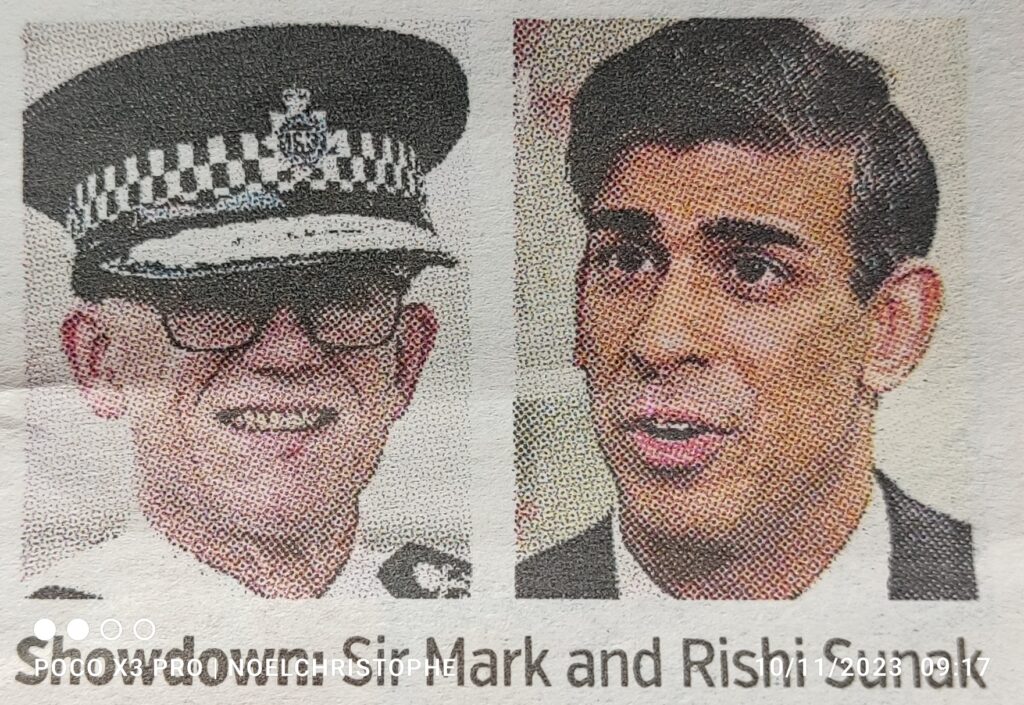
A Pro-Palestine march is scheduled to proceed through London on Armistice Day, despite a recent clash between Rishi Sunak and Metropolitan Police Commissioner Sir Mark Rowley. The highest-ranking police officer in Britain was summoned to No.10 Downing Street by the Prime Minister, who had emphasized that he would be held accountable if any disturbances occurred near the Cenotaph during the nation’s commemoration of fallen soldiers. While there were calls to ban the march, Sir Mark maintained that the risk did not reach the threshold necessary to invoke powers available under Public Order laws. In this article, we will explore the developments surrounding the march and the concerns raised by various stakeholders.
The Prime Minister’s Statement:
Following their meeting, the Prime Minister expressed his satisfaction with the outcome, stating that the police had confirmed the march would be conducted away from the Cenotaph, and that they would ensure the timing did not conflict with any Remembrance events. However, he also acknowledged the risk of certain groups exploiting the occasion to sow division in society. The Commissioner has assured that the Metropolitan Police’s approach will be continuously assessed based on the latest intelligence regarding the nature of the protests. The Prime Minister added that his responsibility was to hold the Commissioner accountable for his decision to allow the march.
Organizers’ Stand:
Despite appeals to postpone the demonstration, the organizers have rejected such pleas. The march aims to advocate for a ceasefire in Israel’s actions in the Gaza Strip, which has been besieged and bombarded since the ruling Hamas terror group carried out cross-border raids, resulting in the loss of at least 1,400 lives on October 7. The planned route for Saturday’s march stretches from Hyde Park, approximately a mile away from the war memorial, to the US embassy in Vauxhall. Sir Mark has affirmed that the organizers have displayed complete willingness to avoid the Cenotaph and Whitehall, ensuring that the nation’s remembrance events remain undisturbed.
Concerns and Right-Wing Response:
While the organizers have demonstrated their commitment to peaceful protest, concerns persist that some participants may deviate from the agreed route. Additionally, right-wing groups have called on their members to converge on the capital to confront the protesters. Home Secretary Suella Braverman has referred to these weekly demonstrations as “hate marches,” reflecting the government’s stance on the matter.
Labour Leader’s Perspective:
Labour leader Sir Keir Starmer has emphasized the need to respect Remembrance events unequivocally. However, he believes that the Prime Minister ought to hold his Home Secretary accountable for her actions, rather than engaging in confrontation with the police, which he views as an act of cowardice.
Recent Arrests:
Since October 7, nearly 200 individuals have been arrested in London for hate crimes or public order offenses. Among these arrests, 98 are related to suspected anti-Semitism, 21 to alleged Islamophobia, and 12 to other faith-related crimes.
Conclusion:
As the Pro-Palestine march is set to take place in London on Armistice Day, tensions and concerns surrounding the event persist. While the Metropolitan Police Commissioner has asserted that the necessary thresholds for invoking Public Order laws have not been crossed, the government and various stakeholders continue to monitor the situation closely. The coming days will reveal how the march unfolds and whether it remains peaceful and respectful of the nation’s remembrance events.
By Noel Christopher
